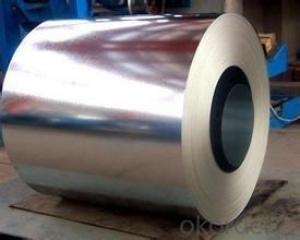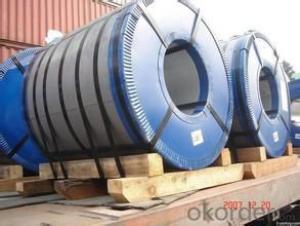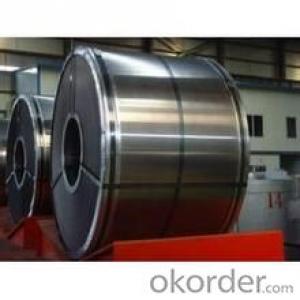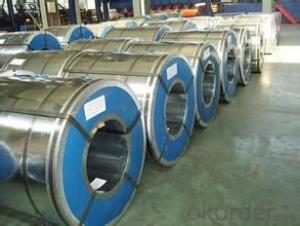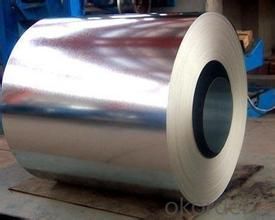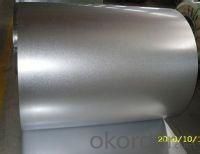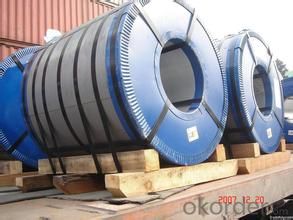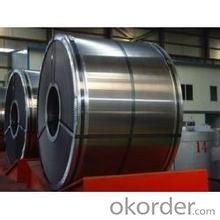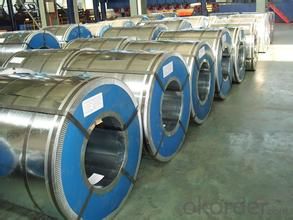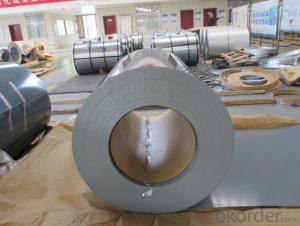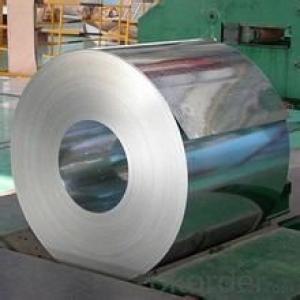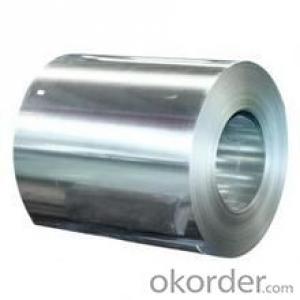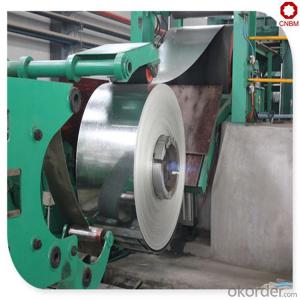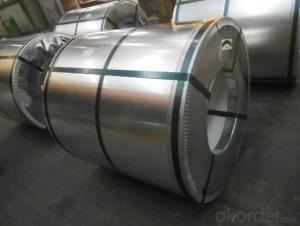Hot-dip galvanized steel coil SGCC in China
- Loading Port:
- Tianjin
- Payment Terms:
- TT OR LC
- Min Order Qty:
- 100 m.t.
- Supply Capability:
- 5000000 m.t./month
OKorder Service Pledge
OKorder Financial Service
You Might Also Like
Description:
1.Mateials:SGCC,DX51D / DX52D /S250,280GD
2.Size:width:600-1250mm(900mm,1215mm,1250mm,1000mm the most common)
thickness:0.15-2.0mm
length:1000-6000mm,as your require
3.Zinc coating :60-180g( as required)
4.Coil id:508mm
5.Coil weight: 3-5MT(as required)
6. Surface:regular/mini/zero spangle, chromated, skin pass, dry etc.
Applications:
Galvalume Coil widely used for roofing products, It is also the ideal base material for Prepainted Steel Coil.
1. roofing
2. gutters
3. unexposed automotive parts
4. appliances
5. furniture
6. outdoor cabinetry
Images:
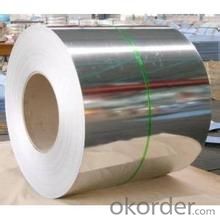
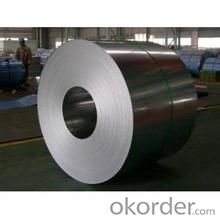
Production of cold formed corrugated sheets and profiles for roofing, cladding, decking, tiles, sandwich walls, rainwater protective systems, air conditioning duct as well as electrical appliances and engineering.
- Q: What are the challenges in the production of steel coils?
- There are several challenges in the production of steel coils. Firstly, maintaining consistent quality and meeting the desired specifications can be difficult due to variations in raw materials, production processes, and equipment performance. Secondly, ensuring efficient and cost-effective production requires careful planning and optimization of various factors such as energy consumption, material handling, and logistics. Thirdly, the steel industry faces environmental challenges related to emissions, waste generation, and resource consumption, which necessitate sustainable practices and compliance with regulations. Lastly, competition in the global market demands continuous improvement and innovation to stay ahead in terms of product quality, cost competitiveness, and customer satisfaction.
- Q: All the steel straps that secure my deck and stair 6x6 posts to the concrete piers have some rust on them. Had bought a rust reducer to spray on them and repaint. As I went to do this I found that one of them is on its last legs, with the steel rusted through and bubbling up all up the sides of the straps. Since this is the end post on a row of 3 deck support posts, I was thinking of removing as much rust as possible, then paint with Rustoleum and cover lower post with something to keep water away from post and pier in the future? Was thinking of something removeable so I could check on it for further rusting. What do you folks with building experience think of this? Thanks.
- If these steel straps are rusting through and on their last legs, a coat of paint is going to be cosmetic at best. Replace these straps with new ones. The originals were either very poorly galvanized, or you live someplace with a very corrosive environment. In any event, paint can't save this sort of thing. Steel brackets serve a real purpose, and after they're weakened, they can't do that anymore. How would your home hold up in an earthquake, for example? What you're proposing doesn't sound safe.
- Q: Molton is formed at 2800 F. Thats a fact. Now jet fuel at its hottest is 1800. Where does the other 1000 degress come in? And it was found at the WTC 7 site. Was this hit by a plane? A simple fire COULD NOT produce molton. This is a fact. Molton is formed during controlled demoliton of a building since all the bombs in the buiding go off and its very very hot. The fact there was MOLTON at the site is shocking to some since it is IMPOSSIBLE for molton to form from jet feul alone. Impossible. It needed another source. Now the claim that I'll get is that it weakened the stell but then we would find weak steel not molton. Why do you seem to throw this off of your shoulder? Do you not want to belive it? I'm no jet fuel guy but I know you cannot make molton by using just jet fuel. This is really proof that 9/11 was an inside job.
- I think there are things that you are missing here. First of all I looked up the MSDS sheet for Steel from US Steel. Steel is made of all kinds of different metals to start with and the melting/freezing point for steel is 1750 F not 2800 according to US Steel. In addition in the World Trade Center buildings there were all kinds of other materials that are normally used in construction that were all burning at the same time which would have added to the temperatures. Not only was it steel but it was iron, calcium and other building materials too. NIST provides a maximum gas temperature due to WTC fires of 1,000 °C: In no instance did NIST report that steel in the WTC towers melted due to the fires. The melting point of steel is about 1,500 degrees Celsius (2,800 degrees Fahrenheit). Normal building fires and hydrocarbon (e.g., jet fuel) fires generate temperatures up to about 1,100 degrees Celsius (2,000 degrees Fahrenheit). NIST reported maximum upper layer air temperatures of about 1,000 degrees Celsius (1,800 degrees Fahrenheit) in the WTC towers (for example, see NCSTAR 1, figure 6-36) Okay I don't know if you know who NIST is but that is the National Institute of Standards and Technology and they are some pretty smart people. They did not say that the steel melted due to the fires, but they did say that the temperatures surely did get high enough to to melt the steel. If US Steel says the melting point for steel is 1750 and NIST says that the temperatures were around 1800 F then that is high enough to melt the steel. I think the key is that there were other materials burning too.
- Q: What is the accuracy of steel tape inspection?
- The project is through the detection of steel tape, steel tape each batch have the error him different, so do projects each into a batch of steel tape has to go through the inspection department, let this batch of steel tape has reached the same error range. All the measuring tools in this project are unified into these steel tape measures, so that the measurement error is guaranteed.
- Q: Cast steel welding
- Normal okorder /.. Mild steel and cast steel produces a very long stream of brilliant sparks, with some forking. CI produces much shorter, dull reddish sparks and the volume of sparks is much less. many highly branched or intermittent sparks will be seen.
- Q: What is stainless steel 316, and what are its properties and uses?
- For machined aspects 416 cautioned. For welded aspects 316 is cautioned. besides the shown fact that 316 supplies a greater advantageous corrosion resistance. oftentimes the only benefit for 416 is machinability others than that 316 is greater advantageous
- Q: What are the key players in the steel coil manufacturing industry?
- Large multinational companies with significant market share and influence dominate the steel coil manufacturing industry. Among the prominent players are: 1. ArcelorMittal, the world's largest steel producer, operates in over 60 countries and offers a diverse product portfolio. 2. Nippon Steel Corporation, a leading Japanese steelmaker, holds a prominent position in the global steel coil manufacturing market, particularly in the automotive and construction sectors. 3. POSCO, based in South Korea, is renowned for its high-quality steel products and advanced technology in steel coil manufacturing. 4. Baosteel Group Corporation, the largest steel manufacturer in China and globally, boasts a vast range of steel products, including steel coils, and excels in research and development capabilities. 5. Thyssenkrupp AG, a German multinational conglomerate, plays a significant role in the steel coil manufacturing industry, focusing on innovation and sustainability across a diverse product range. 6. United States Steel Corporation, a leading American steel producer, holds a crucial position in the steel coil manufacturing industry, particularly in the automotive, construction, and energy sectors. 7. JFE Holdings, Inc., a Japanese steel conglomerate, is a key player in the steel coil manufacturing industry, known for its customer-oriented approach and high-quality steel products. These companies represent a fraction of the key players in the steel coil manufacturing industry, as numerous others contribute to this sector. The industry is highly competitive, and these companies consistently strive to innovate, enhance efficiency, and meet the evolving demands of the market.
- Q: How are steel coils used in the manufacturing of roofing materials?
- Steel coils are used in the manufacturing of roofing materials as they serve as a primary raw material for producing metal roofing sheets and tiles. These coils are processed through a series of steps such as cleaning, coating, and shaping to create durable and weather-resistant roofing products. The steel coils are rolled out and cut into the desired size and shape, ensuring uniformity and precision in the manufacturing process. These roofing materials made from steel coils offer exceptional strength, longevity, and protection against various weather conditions, making them a popular choice for residential and commercial buildings.
- Q: How are steel coils used in the production of industrial machinery?
- Steel coils are used in the production of industrial machinery as they provide a strong and durable material for various components. These coils are often shaped and cut to specific sizes to create parts such as gears, shafts, and frames, which are essential for the functioning of machinery. The high strength and flexibility of steel coils make them ideal for withstanding heavy loads and harsh operating conditions, ensuring the reliability and longevity of industrial machinery.
- Q: How are steel coils used in the production of roofing panels?
- Steel coils are used in the production of roofing panels by being fed through a machine that shapes and cuts the steel into the desired panel size and shape. The coils are unrolled and flattened, then passed through a series of rollers to form the corrugated or flat panel profile. This process ensures the panels have the strength and durability required for roofing applications.
Send your message to us
Hot-dip galvanized steel coil SGCC in China
- Loading Port:
- Tianjin
- Payment Terms:
- TT OR LC
- Min Order Qty:
- 100 m.t.
- Supply Capability:
- 5000000 m.t./month
OKorder Service Pledge
OKorder Financial Service
Similar products
Hot products
Hot Searches
Related keywords
